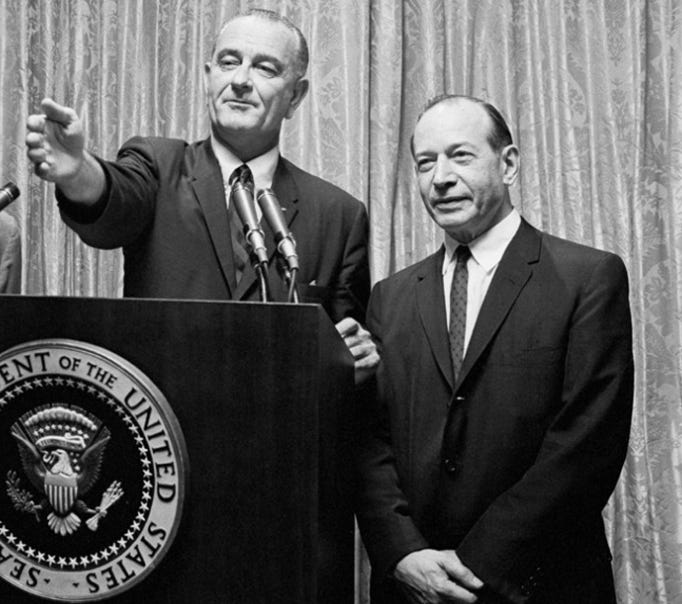With new reporting from Pro-Publica showing that Associate Justice Sam Alito — just like Associate Justice Clarence Thomas — has been receiving generous “gifts” from conservative billionaires with business before the Supreme Court, it’s worth remembering the time conservatives hounded a liberal justice off the bench for improper financial ties to a Wall Street financier.
Abe Fortas was a longtime ally and political confidant of President Lyndon Johnson, who not only placed Fortas on the Supreme Court in 1965 but also nominated him to succeed Earl Warren as Chief Justice when Warren announced his intention to retire in 1968. All sides knew that Fortas’s elevation would effectively mean the continuation of the Court’s liberal streak for another generation.
Accordingly, a coalition of Republican and Southern Democratic conservatives in the Senate moved aggressively to block the promotion. They seized on reports that Fortas had been paid $15,000 to give a series of lectures at American University Law School, a fairly large sum for light work.
Republican Senator Strom Thurmond threatened to lead a filibuster against the nomination, which barely survived a cloture vote in the Senate. Realizing the level of resistance would be too strong to overcome, LBJ withdrew the nomination, leaving the Chief Justice seat open for the next president — Richard Nixon — to fill.
Though humiliated, Fortas remained on the Court as an Associate Justice. But the very next year, additional revelations surfaced that, while on the Court, Fortas had accepted a $20,000/year retainer from the foundation of Wall Street financier and friend Louis Wolfson. Soon after accepting the deal in 1966, Fortas changed his mind and ended the arrangement, believing it to be improper.
The story broke in May 1969, in a thorough account of Fortas’ relationship with Wolfson that ran in Life Magazine. (Film buffs will likely recognize this famous photo of actors Peter Falk, Ben Gazzara, and John Cassavettes, but the bombshell was in the upper right.)
Wolfson at this point was in serious trouble, with investigations about securities violations underway and rumors of his seeking a presidential pardon — with his old friend Abe’s help? — running wild.
President Nixon immediately ordered his Justice Department to launch a full-scale investigation into Fortas, and Attorney General John Mitchell made ominous noises about filing federal charges for tax evasion that would ruin Fortas as well as his wife.
Just eleven days after the Life story, Fortas announced that he would resign from the Supreme Court. He felt blindsided — later saying “it was as if an automobile hit me as I stepped off the curb” — but believed he had no choice. “If I stayed on the Court,” he later told Ben Bradlee of the Washington Post, “there would be this constitutional confrontation that would go on for months. Hell, I feel there wasn’t any choice for a man of conscience.”
Those without a conscience, though, were thrilled with the results. When the Nixon administration learned that the pressure campaign had worked, White House Counsel John Dean remembered, they threw an impromptu party in the Attorney General’s office. Mitchell called in “the team that had been running the smoke machine” to congratulate them on their work, and the Deputy AG started pouring drinks. Nixon himself called the team to thank them for their work.
Fortas’s scandals had given Nixon the chance to appoint a Chief Justice, and now they would give him the chance to make an additional appointment to the Court.
In practice, that would prove difficult as Nixon’s first two nominees — southerners Clement Haynsworth and G. Harrold Carswell — were both defeated in the Senate. Haynsworth was attacked for a number of rulings against civil rights and labor causes; Carswell was revealed to be a former segregationist and a thoroughly mediocre judge. (In the lamest defense ever given, Senator Roman Hruska asked reporters: “Even if he were mediocre, there are a lot of mediocre judges and people and lawyers. They are entitled to a little representation, aren't they, and a little chance?”)
In the end, Fortas was replace by Harry Blackmun. Conservatives succeeded in driving a liberal from the Court and wound up getting the author of Roe v. Wade.
Though their crusade against Fortas backfired a bit on conservatives, they succeeded in keeping a justice they despised from rising to the top spot and even from staying on the Court. They played hardball and won.







I was surprised to learn that Strom Thurman had switched to the Republican party as early as 1964. I thought most of those Jim Crow Democrats became Republicans much later
Need a supercut of Roman Hruska quotes. I found plenty of nonsensical gibberish from him while researching for my dissertation. That man never fails to deliver.